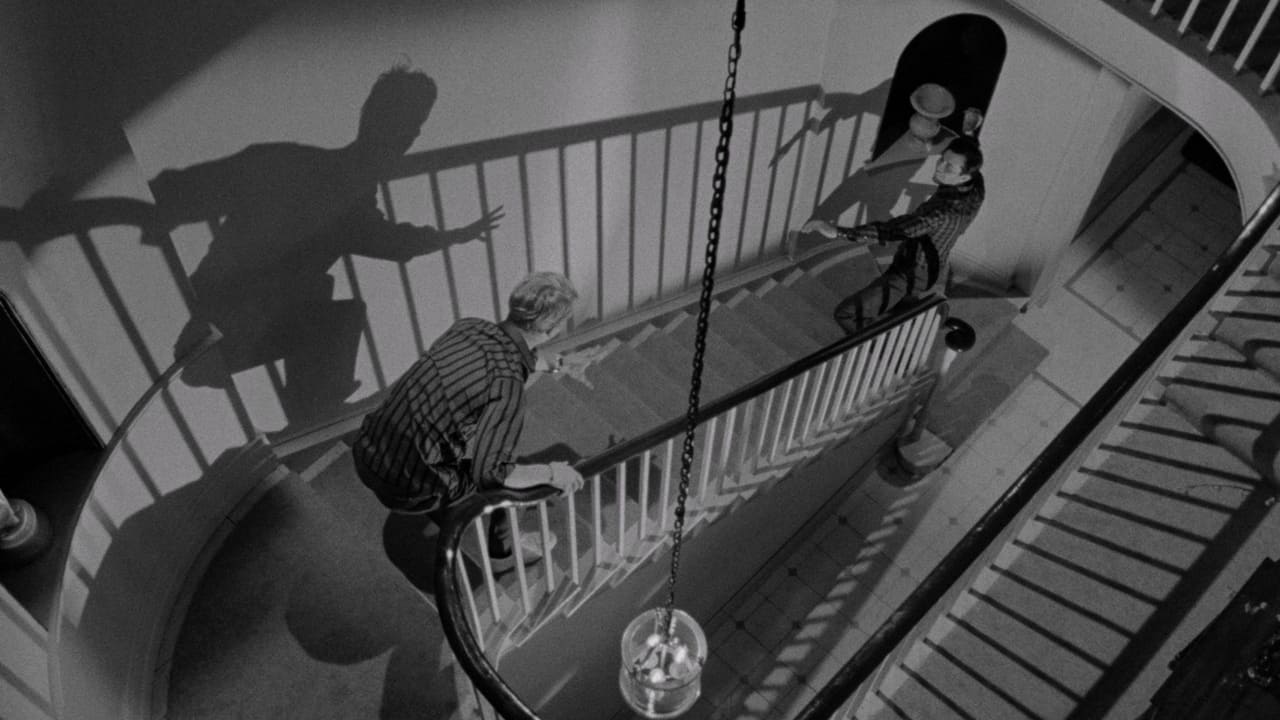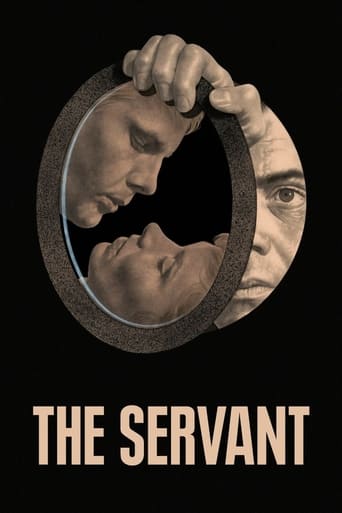

Please don't spend money on this.
... View MoreExcellent, a Must See
... View MoreBlending excellent reporting and strong storytelling, this is a disturbing film truly stranger than fiction
... View MoreThe movie's not perfect, but it sticks the landing of its message. It was engaging - thrilling at times - and I personally thought it was a great time.
... View MoreTHE SERVANT is a psychological drama, which examines relations and customs of high society in London. This is a film about social degradation, in which, we can feel, through fictional fog, a bitter truth.A rich young man hires a cockney as his manservant. No sooner has he donned his working clothes a servant begins exercising a subtle but insidious control over his master. However, the two men form a quiet bond, until a master's fiancée does no doubt the behavior of a tricky servant. A servant brings his own lady friend, whom he presents as his sister, into his master household as a maidservant. At his insistence, she seduces a young master...Most protagonists exhibit strange charm and treachery at the same time, which gives a special tone to this film. The emotions are divided between frustration and jealousy. A kind of trap for a master by his servant is poisoned by a small amount of a tense eroticism and hedonistic madness. The anxiety of a wealthy eccentric, comes to the fore in those moments.That dirty game, which leads to destruction, does not corresponds with a warmth of interiors. It is also an ironic reference to the class history and tradition.Characterization is very good. The photography fully corresponded to a melancholic soundtrack.Dirk Bogarde as Hugo Barrett is a charming and cunning servant. His sadistic and vengeful instincts contribute to that destructive moment. He is a victim of his own madness, in which he shows all his weaknesses. James Fox as Tony, a young master, is a personification of a failed ambition, arrogance, immaturity, indecision and helplessness at the end. Wendy Craig as Susan Stewart is a strong and stubborn young woman, who is lost in her pride and dignity. However, she shows a single dose of helpless pathos while flees to salvation. Sarah Miles as Vera is a "prisoner" of a dirty game.When common sense flees through the door, it is enough to turn off the light.
... View MoreLosey and Pinter's first collaboration (they would continue their rapport in ACCIDENT 1967 and THE GO-BETWEEN 1970), THE SERVANT imposes an alluring tale of a subversive master-and- servant relationship, with heavy homo erotic undertones (the author of the source novel Robin Maugham is "defiantly homosexual") way ahead of its era, so it is time to revive this hidden gem to make it circulate to a more open-minded demography for its sheer marvelousness.A young aristocrat Tony (Fox) hired Barrett (Bogarde) as his servant to administer his house, but Barrett has his own plan to manipulate Tony to be completely reliant on him, so assisted by his complicit Vera (Miles), and hampered by Tony's supercilious fiancée Susan (Craig), it is a binge of seduction, betrayal, debauchery, drug abuse and mind games. Douglas Slocombe, the prestigious British cinematographer, brings the film to life with his ingenious camera-work, the setting is largely confined interior to Tony's residence (dominantly in the shots is a bookshelf-shape door to the living room, camouflage beyond the veneer is a running theme here), Slocombe is ravishing the eroticism and tautness by his superlative deployments with mirrors (it is in the poster!), shadows, shades (Tony's silhouette hiding behind the shower curtain during a hide-and-seek) and sublime focus-alteration, refracted by the B&W prism, the potency is mind-blowing and soul-cleansing, up to the very end, the transcendent oddity of the situation could only pique one's curiosity for more, for the imbroglio is so fascinating, so nihilistic, anticipates A CLOCKWORK ORANGE (1971, 8/10)'s benumbing ridicule.John Dankworth's alternately light-mood, lyric, jazz-infused and riveting score is a handsome companion to Pinter's satirical and pun-slinging screenplay (under the weather? poncho and gaucho?), when Tony addresses to Susan that "he (Barrett) looks like a fish", it hits the bull's eye. Bogarde continues his bold glass-ceiling-breaking endeavor after VICTIM (1961, 8/10), bags another self-revealing role and unleashes his nefarious audacious in the duality of Barrett's servant-and-master changeover; while his on-screen prey James Fox, who, indeed, is equally brilliant in this breakthrough picture, out of four main characters, none of them are good- natured, but he is the only one can collect viewers' sympathy, and one may not root for him, but witness his downfall nevertheless needs more than the fondness of his willowy figure and innocent eyes. Miles and Craig, the two female companions, can not receive the same laud, Miles has a strident voice and being excruciatingly annoying whenever she talks and her performance is in excess of theatricality, which luckily would tune down in her later effort in RYAN'S DAUGHTER (1970, 7/10) and THE HIRELING (1973, 6/10); Craig, whose snobbish and frigid poise is off-putting, albeit she has the most recondite sensibilities to present in the frenzied coda, the efficacy is beyond her ken.THE SERVANT may be Losey's finest work and should be appreciated more, it is a divine psychological drama with a latent homosexual struggle which perpetually beleaguers human nature and finally we reach the opportune time when we can look directly into each other's eyes without feeling ashamed or offensive anymore.
... View MoreAs films from the early 60s go, this is one of the darkest and most disturbing I've seen and dealt with very explicit and frightening issues. Long after I'd seen it, it stayed in my mind and worried me. I felt sorry for Tony, the rich aristocrat (James Fox) and frustrated for how he was treated, but also cross at his girlfriend for not doing anything to help him. His downfall was vividly portrayed by the great Fox and the miscreant Barrett played with superb calm and maliciousness by Dirk Bogarde was simply insidious but spectacular.Other than a psychological portrait of the moral and societal decline of Tony, it also highlights the blindness and callousness with which people act and don't really see or help anyone but themselves and are just selfish at heart. Even the "posh" people. I don't condone what the manservant did but I can see the frustration with which people in service must have felt and how easily they could be manipulated but trusting dolts who don't have a clue about anything as someone has always "done" for them.Everything about this production is dark and foreboding; the script relies on silences, and short dialogue, it uses darkness and grimness in the lighting and in the sets, despite it being a lovely rich home, and the decline is slow and painful to watch. You see ways he could have protected himself, how his girlfriend could have helped him but he is left alone to sink to the depths. Definitely not a "Hollywood" movie and it leaves you feeling emotionally shredded. As well as all this, the sexual tension of the film is quite intense, there is seduction between Tony and Vera, Barrett's "sister" girlfriend (a manipulative Sarah Mills) but also a weird homoerotic atmosphere between Tony and Barrett which doesn't really seem real or going anywhere or whether there's a point to it but it adds to the tension and dare I say it a sort sexual overtone to the film. I was surprised how explicit it was, and dealing with such taboo subjects for the time. It's a brilliant psychological drama but tragic and really really grim.
... View MoreNot only Hugo Barrett, the Bogarde character, but also Pinter, Losey, and Maugham, Somerset's young nephew, combine most effectively and unpleasantly in producing this dirty little story. It has made at least one person want to take a cleansing shower after watching it. Two, in fact. Another person is left with a creepy, nasty feeling; although they also seem to think it excellent. It's very obviously well-constructed, cunning, subtle and clever.Bogarde slips into his slimy character's skin so perfectly that it fits him like a glove. He first appears on the doorstep as a sort of neo-vampire, setting out to suck his hapless victim dry, and strip him of every shred of dignity. A major flaw in this scenario is that the James Fox character has so little dignity to start with. It is neither moving nor instructive to see an utterly useless self-deluding nonentity reduced from nowhere to nothing. In fact, it is distasteful, off-putting and even disgusting.My disc came with an extra feature in the form of a wordy talk by a man called Ian Christie, described as "Director AHRB for British Film", and who is also, as may be discovered from his devotedly self-regarding fansite, Professor of Film and Media History at Birkbeck, University of London. He comes up with some interesting, but also frequently trite and banal, remarks about this film. He doesn't, however, seem to have a firm grip of his subject. For instance, he presents a photograph of three men in a row, labelled James Fox, Joseph Losey and a third called Dick (sic) Bogarde. The man shown as Dick (sic) Bogarde is actually Harold Pinter, author of at least one great script, called "The Caretaker".Then Christie refers to an otherwise unknown American actor called Rock Hunter, saying "Imagine if Rock Hunter had played a part like the one played by Bogarde?" I imagine he would have been successful. After that, Christie says (twice) that the first film directed by Dick Lester with the Beatles was called "Help", 1965. Some of us, not film professors, thought it was "A Hard Day's Night", 1964. In that film a man on a train from Liverpool to London is mocked for having fought in WW2. Christie thinks this happened in "Help". Someone at Studio Canal might have helped Christie with the text of his feature before sending it out to the world.For the record, the actor Dirk Bogarde's real name was Sir Derek Jules Gaspard Ulric Niven van den Bogaerde. A man with a name like that deserves several servants. The Beatles were a forgettable pop group, accurately described by Cassius Clay, who met them just before his sensational and memorable 1964 defeat of Sonny Liston, as a bunch of little sissies.Christie points out, what most viewers recognise, that there is a semi-submerged homosexual sub-text to "The Servant". Among the puzzles posed by this movie is how a world so often described as gay could consist of such deeply depressing misery. Presumably because its gaiety is diagnosed as repressed. The servant also acts as a nanny to his enfeebled employer, dosing him with what looks like Dr Collis Browne's medical compound of laudanum, cannabis and chloroform. The film should evoke a response from homophobes, a word not only etymologically specious and incorrect, but also demonstrating political incorrectness.If I weren't so sickened and repelled by the whole performance, I'd give it more stars than seven. I'd seen it when it first came out, and recalled that I hadn't liked it. All I really remembered about it was the rather silly and pointless Cropper joke at the beginning.Finally, it doesn't seem to be primarily about either repressed queerness, or class warfare, but about the ancient truism that when men seek power the search becomes evil and corrupting. Some time after this film was made, James Fox split with Sarah Miles and got religion.
... View More